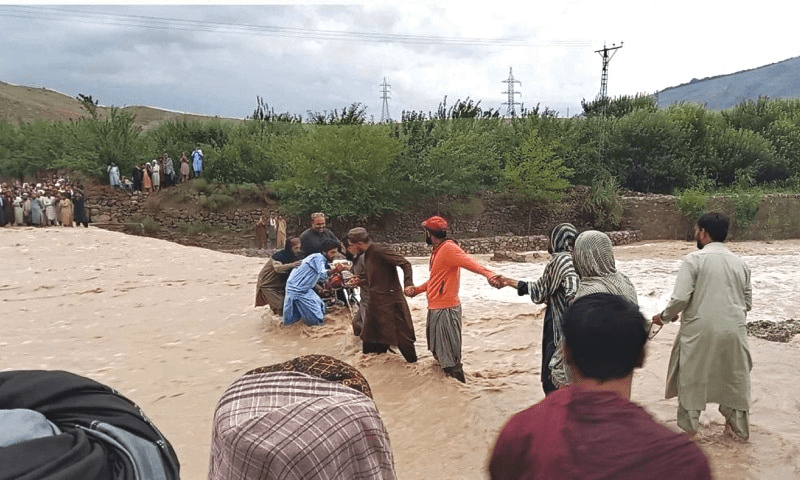Monsoon rains have unleashed devastation across Pakistan, leading to at least 11 deaths and numerous injuries. Flash floods, triggered by these heavy rains, have wreaked havoc in Rajanpur, Dera Ghazi Khan, Toba Achakzai, and other regions. Houses and crops have been damaged, roads and bridges washed away, and roofs collapsed. In Balochistan alone, ten people were injured in various rain-related incidents.
Monsoon rains in Chaman washed away a railway track and damaged another in Noshki, severing the rail link between Pakistan and Iran. Faisalabad experienced heavy downpours, with 131mm of rain recorded in Madina Town. The Water and Sanitation Agency (WASA) reported significant rainfall in other areas too.
The Pakistan Meteorological Department (PMD) has updated its advisory. The monsoon rains are now moving from Karachi and lower Sindh towards central and upper Sindh and Balochistan. Heavy rainfall is still expected in cities like Jacobabad, Larkana, Dadu, Shikarpur, Ghotki, and Sukkur. The PMD predicts that these monsoon rains may continue to affect Sindh until August 19.
Sukkur faced a blackout after receiving substantial rainfall. The Sukkur mayor claimed that 290mm of rain fell within 24 hours, breaking a 77-year-old record. However, PMD Director Muhammad Sarfraz reported that 100mm of rain was recorded until 8:00 AM.
Meanwhile, monsoon rains continued to cause widespread destruction in Balochistan, resulting in three deaths and multiple injuries. Many areas have been cut off, with roads closed and railway tracks submerged. A shortage of food supplies has emerged due to these disruptions.
Flash floods have washed away bridges in various parts of Balochistan, stranding hundreds of vehicles. District administrations have established flood control rooms across the province in response to the ongoing crisis. Khuzdar and its tehsils remain submerged, damaging standing crops and agricultural equipment.
Tragically, in Sarwana, lightning killed two young boys, aged 12 and 8, along with eleven goats they were herding. Landslides caused by the monsoon rains have closed the Shahdadkot-Khuzdar Road in the Wangu Hills, and travelers are advised to exercise caution.
In Kurdugap tehsil of Mastung, a woman was swept away by floodwaters while crossing a bridge. Her body was recovered several kilometers downstream. Heavy rainfall in Chaman has also led to the suspension of passenger train services due to damaged railway tracks.
The national highway from Bhaag to Bakhtiarabad has been closed due to torrential rains, causing a shortage of essential food items. Prices have risen, and there is a public outcry for the highway’s immediate reopening.
In Dera Allah Yar, heavy rainfall has turned roads into lakes, submerging the DHQ Hospital and suspending train services. The Jaffer Express, traveling from Rawalpindi to Quetta, was delayed for two and a half hours due to flooded railway tracks.
In Bolan and Mach, flooding has stranded hundreds of vehicles on the Bolan National Highway. The Kohlu-Sibi National Highway has been closed for several days, severing the connection between Kohlu and neighboring districts. Monsoon rains have also submerged low-lying areas in Kohlu, affecting the only national highway linking it to interior Balochistan.
The Sibi-Harnai railway section has been closed since July 21 due to flood damage. Floodwaters also washed away the Quetta-Taftan railway section near Nushki, halting train services.
The NDMA warns of urban flooding in Balochistan cities like Kalat, Ziarat, Zhob, and Quetta in the next 24 to 48 hours due to ongoing monsoon rains. The water level in Manchhar Lake has exceeded 112.5 RL, causing medium-level flooding in the Indus River. The road communication of dozens of villages in Johi, Sehwan, and Bhan Saeedabad has been cut off due to the rising waters.
Kotri Barrage is seeing an increase in water discharge due to 372,610 cusecs of water at the Sukkur Barrage downstream. The Kacha areas of Khairpur, Nowshehro Feroz, Nawabshah, and Matiari are submerged, and residents are relocating to safer places. The PDMA has issued a flood warning for Qamber-Sahdadkot, Dadu, and Jamshoro districts in Sindh.
Meanwhile, the rapidly rising River Chitral, driven by accelerated glacier melting, continues to devastate villages and roads in Upper Chitral. The river has destroyed homes, fields, and orchards in several villages. Despite the damage, little government intervention has been seen.
The NDMA reports that nearly 200 lives have been lost across Pakistan due to monsoon rains since July 1.


